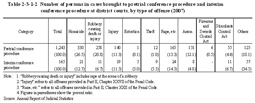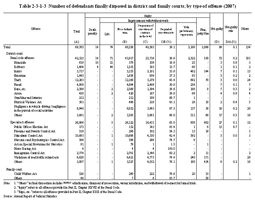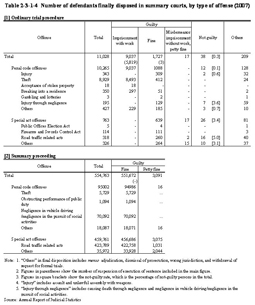| Previous Next Index Image Index Year Selection | |
|
|
2 The first instance In addition, in order to realize prompt trials taking place through the establishment of clear trial plans prior to the first trial date after indictment, cases may be brought to pretrial conference procedure. The Act on Participation of Saiban-ins in Criminal Trials (Act No. 63 of 2004; hereinafter referred to as the “Saiban-in Act”) defines that cases covered by Saiban-in trials (denoting criminal trials with the participation of Saiban-ins (lay judges); hereinafter the same) shall be all subject to the pretrial conference procedure. Cases may also be subject to the interim conference procedure, in which the issues and evidence of the case can be arranged in the same procedure as the pretrial conference procedure after the first trial date if the court deems it necessary in light of the progress of the trial. Table 2-3-1-2 shows the number of cases brought to the pretrial arrangement proceeding and the interim conference procedure at district courts in 2007. Table 2-3-1-2 Number of persons in cases brought to pretrial conference procedure and interim conference procedure at district courts, by type of offense (2007) Table 2-3-1-3 shows the number of defendants finally disposed by district and family courts in 2007 by type of offense. Table 2-3-1-4 shows the number of defendant finally disposed (through either the ordinary trial procedure or summary proceedings) by the summary courts in the same year by type of offense.Table 2-3-1-3 Number of defendants finally disposed in district and family courts, by type of offense (2007) Table 2-3-1-4 Number of defendants finally disposed in summary courts, by type of offense (2007) Among persons finally disposed in the first instance of district courts in 2007, those for theft were the largest in number at 12,265 (17.7%), followed by those for Stimulants Control Act violations at 10,695 (15.4%), negligence in vehicle driving /negligence in the pursuit of social activities at 6,946 (10.0%), and violations of road traffic related acts at 6,620 (9.5%).Among persons finally disposed by family courts for adult criminal cases in 2007, 87.6% (326 persons) were for Child Welfare Act violations. Looking at persons finally disposed by summary courts through ordinary trial procedure by type of offense in 2007, among those sentenced to imprisonment with work, 94.0% (8,493 persons) were for theft. Among those sentenced to fine, those for theft were the largest in number, accounting for 23.9% (412 persons), followed by those for injury at 17.9% (309 persons) and those for violations of road traffic related acts at 15.1 % (260 persons) in that order. Looking at persons punished with fines or petty fines through summary proceedings by type of offense, violations of road traffic related acts accounted for 76.4% (423,789 persons) and negligence in vehicle driving/negligence in the pursuit of social activities accounted for 12.6% (70,092 persons). In the same year, there were 5,729 persons and 1,094 persons punished with fine through summary proceedings for theft and obstruction of performance of public duty respectively. Table 2-3-1-5 shows the number of persons whose cases are brought to speedy trial procedure at district courts and summary courts in 2007. Table 2-3-1-5 Number of persons in cases brought to speedy trial procedure (2007) |



